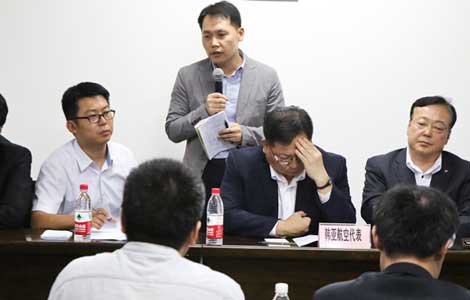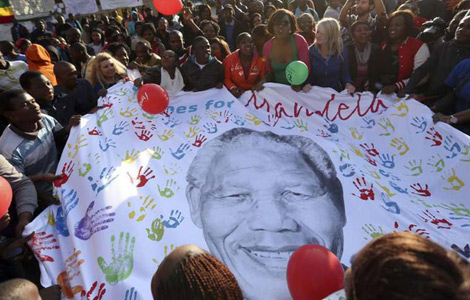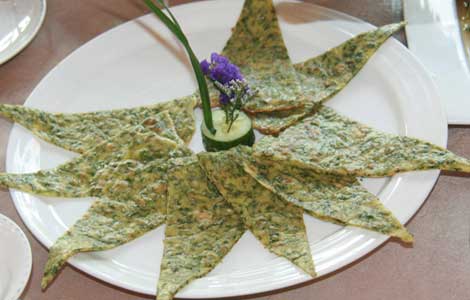Luxury brands pin hopes on H2
Updated: 2013-07-19 11:29
By Wang Wen (China Daily)
|
||||||||
Makers of luxury brands, which have been pinning their hopes in China's market during the global economic recession, have mixed feelings about the market in the second half of 2013.
The good news is that China's luxury market will recover gradually in the second half of the year. However, the high-speed growth enjoyed over recent years will never return.
The growth in China's luxury market revenues will stabilize to an expected 7 percent in 2013, while worldwide revenues will increase by an anticipated 4 to 5 percent, said Bain & Co, a US consultancy, in its spring updated luxury goods worldwide market study.
Growth in the sector in China was 30 percent in 2011 and dropped to 7 percent in 2012, according to the firm.
"China's market will be better in the second half of the year than in the first half because some occasions, such as Mid-autumn Festival, National Day and New Year's Day, will push up sales of luxury items," said Zhou Ting, director of the Fortune Character Research Center.
Chinese confidence in luxury goods, which was restrained by the government's anti-corruption policies from the end of 2012, will return in the second half year.
The people's wait-and-see attitude on whether to buy luxury items is fading away in cities except Beijing, Zhou said.
"The demand for luxury goods in smaller cities is developing much faster than in the big cities, where the market is becoming saturated," she said.
Some Chinese businessmen are also pinning their hopes on the rising number of middle-class people in China, many of whom will buy luxury items for themselves.
Shangpin.com, one of the main online luxury retailers in China, will make a profit this September and October, said Zhao Shicheng, chief executive officer of the online retailer. The website did not make a profit in 2012.
"Our target is that group of people setting out to enjoy themselves and buying luxury fashion items as part of that," said Zhao.
Different luxury items have performed differently in the China market this year.
Sparkle Roll Group Ltd, a Hong Kong-based luxury distributor, revealed its sales of ultra-luxury automobiles and super deluxe watches fell sharply in the financial year that ended on March 31, 2013.
The group's jewelry business operated well with a 24 percent year-on-year increase during the financi\\al year.
"We are optimistic about the potential of the jewelry sector in China," said Tong Kailap, chairman of the group.
In the first quarter of 2013, some main foreign luxury brands enjoyed double-digit growth in China and were satisfied with the results, although they used to enjoy almost 50 percent annual growth.
Sales in the Asia-Pacific region accounted for 41 percent of Richemont Group's total. The luxury items group sells Cartier and Piaget products, with Hong Kong and the Chinese mainland as its two largest markets, the group said in its annual report on March 31, 2013.
The rate in the region moderated following two years of exceptionally high rates of growth. The lower rate was more pronounced in the second six months of the year under review.
Kering Group, one of the world's largest groups retailing in the luxury sector, said its luxury departments experienced a 10 percent increase in the first quarter of 2013 on the Chinese mainland and the mainland continues to post good growth.
"In the year, Greater China represented Burberry's fastest growing major market and this consumer was prominent throughout the retail network," Burberry Group Plc, the British luxury group, said in its 2012-13 annual report to March 31.
Burberry experienced double-digit comparable store sales growth in China in the fiscal year with Chinese customers contributing 25 percent to the brand's global sales, Angela Ahrendts, chief executive officer of Burberry, told Xinhua News Agency.
The luxury' industries' US market also showed strong growth with the trends of the second half of 2012, but some business insiders said Chinese tourists contributed a lot to the Western luxury market.
wangwen@chinadaily.com.cn
(China Daily USA 07/19/2013 page1)

 Detroit files biggest ever US municipal bankruptcy
Detroit files biggest ever US municipal bankruptcy
 Plane crash victims' parents seek answers
Plane crash victims' parents seek answers
 'Improving' Mandela marks 95th birthday
'Improving' Mandela marks 95th birthday
 Qingdao eatery finds use for pesky seaweed
Qingdao eatery finds use for pesky seaweed
 From university campus to boot camp
From university campus to boot camp
 FIFA head: World Cup in Brazil could be mistake
FIFA head: World Cup in Brazil could be mistake
 Bomber as rock star? Rolling Stone cover outrage
Bomber as rock star? Rolling Stone cover outrage
 German band performs with 3D stage set
German band performs with 3D stage set
Most Viewed
Editor's Picks

|

|

|

|

|

|
Today's Top News
Obama weighs canceling Moscow talks with Putin
Pentagon to field 4,000-person cyber squad
NSA implements new security measures
Detroit files biggest ever US municipal bankruptcy
China's Sansha city dock begins operating
Yuan: Collateral types to expand
Autopsy ordered for Hunan fruit seller
Plane crash victims' parents seek answers
US Weekly

|

|






